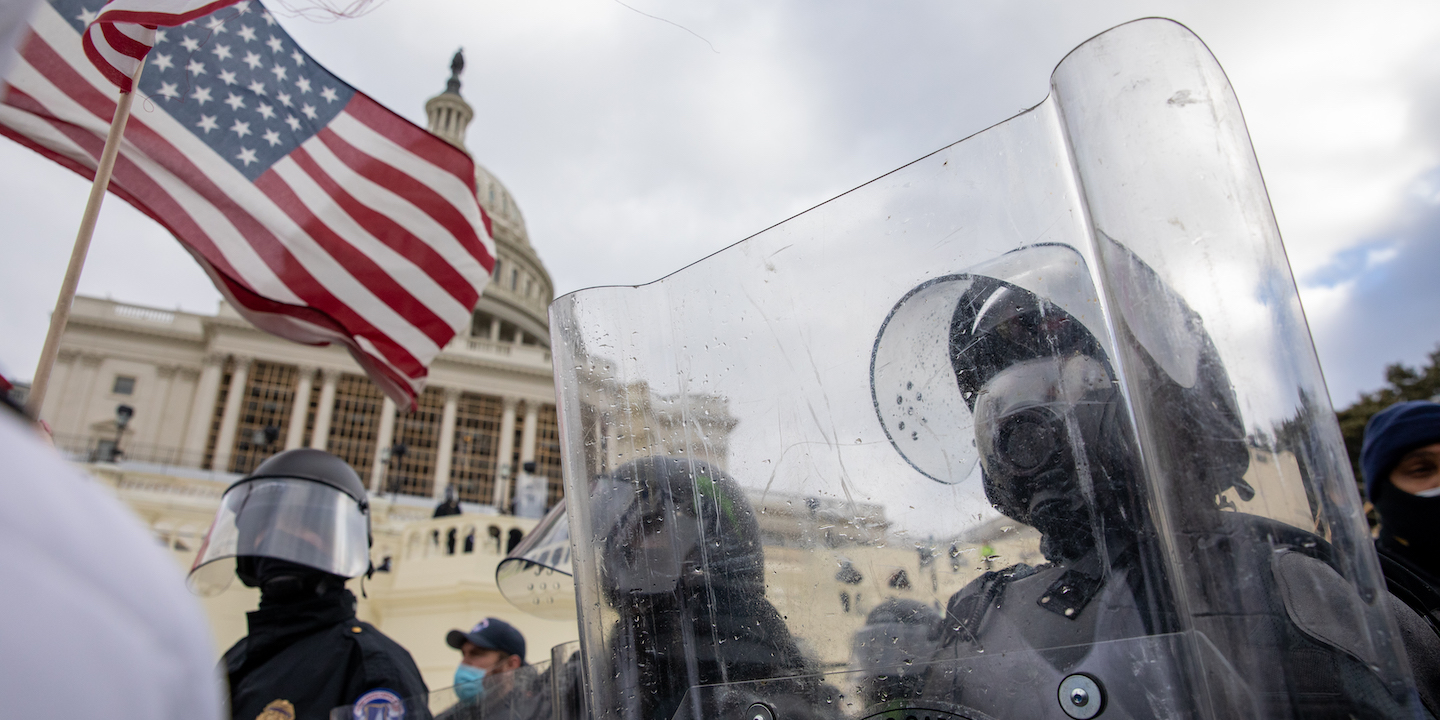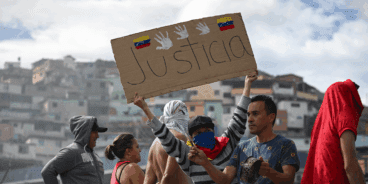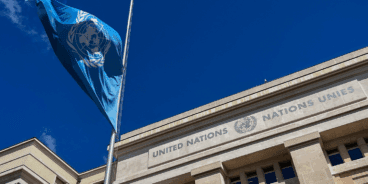

The United States at a Crossroads: The Biden Administration, Human Rights and Atrocity Prevention
After four dark years during which President Donald Trump systematically weakened the United States’ commitment to multilateralism, international law and universal human rights, the Global Centre for the Responsibility to Protect congratulates President-elect Joe Biden and Vice President-elect Kamala Harris on their impending inauguration. As an international civil society organization with its headquarters in New York, we join human rights defenders both here and abroad who view this historic moment with relief and hope.
President Biden and Vice President Harris will be sworn in at a time of unprecedented crisis. The COVID-19 pandemic has caused tremendous suffering around the world and killed over 380,000 Americans. Globally, more than 80.3 million people are also currently displaced by conflict, persecution and atrocities, the highest number since the Second World War. In all too many countries the laws, institutions and individuals who defend human rights appear to be under threat. This includes the United States, where disturbing political developments over the last four years led to the proliferation of online hate speech, the criminalization of asylum seekers and a prejudicial “Muslim Ban” aimed at refugees.
In responding to this global crisis, the Biden administration should prioritize the promotion of human rights and the prevention of atrocity crimes both domestically and abroad. Presidential Study Directive 10 (PSD10), authorized by President Barack Obama in August 2011, declared that the prevention of mass atrocities is a “core national security interest and core moral responsibility” of the United States. The Global Centre for the Responsibility to Protect applauded PSD10, as well as the subsequent establishment of an inter-agency Atrocities Prevention Board in 2012 and the passage of the Elie Wiesel Genocide and Atrocities Prevention Act of 2018. Such initiatives were in keeping with the international principle of the Responsibility to Protect (R2P), unanimously adopted at the UN World Summit in 2005, and were also reflected in the US decision to appoint a high-level official as the country’s R2P Focal Point and join the Group of Friends of R2P at the United Nations.
Norms and institutions that attempt to hold governments accountable for atrocity crimes will always be somewhat controversial, precisely because they require all states to act consistently, and without fear or favor, in defense of universal human rights. Nevertheless, R2P remains the most effective and widely accepted principle around which the international community can coalesce when populations face the threat of genocide, war crimes, ethnic cleansing or crimes against humanity. Since 2005, R2P has been invoked in 91 UN Security Council resolutions, including those authorizing the deployment of peacekeepers to protect vulnerable civilians in Central African Republic, Mali and elsewhere. R2P has also been invoked in 52 resolutions of the UN Human Rights Council, providing early warning of potential atrocity crimes and establishing independent investigative mechanisms.
It is our hope that the Biden administration will now strengthen the United States’ commitment to atrocity prevention and the R2P norm. When the Biden administration assumes office on 20 January, it should set a strategic agenda for how the US government will meaningfully confront mass atrocities in the world. This should include working with the Atrocity Early Warning Task Force and the designated R2P Focal Point to identify global and domestic priorities, in keeping with PSD10 and the Elie Wiesel Act.
President Biden should ensure that US foreign service personnel prioritize the prevention of atrocities. All diplomats should receive specialized training in identifying atrocity risks and undertaking mitigation measures. The United States should ensure that this also features prominently in policy decisions regarding bilateral relations, the provision of aid or military assistance, as well as trade agreements. In addition, states that routinely violate international humanitarian and human rights law, such as Saudi Arabia or Cameroon, should not be permitted to purchase US-manufactured weapons or access other forms of assistance from the US military.
We also implore the Biden administration to reinvigorate the United States’ commitment to multilateralism. The government should immediately re-engage with the UN Human Rights Council and World Health Organization. It should expeditiously restore funding to UN peacekeeping operations, the UN Relief and Works Agency for Palestine Refugees in the Near East and the UN Populations Fund. Rehabilitating the United States’ damaged international reputation will also require working within the UN Security Council and General Assembly to mobilize timely and decisive responses whenever and wherever atrocities are threatened.
This approach should be accompanied by an unequivocal recommitment to international justice. The Biden administration should immediately rescind all Executive Orders targeting the International Criminal Court (ICC) and its officials, including Executive Order 13928 of 11 June 2020 that placed economic sanctions on Chief Prosecutor Fatou Bensouda and the Head of Jurisdiction, Complementarity and Cooperation, Phakiso Mochochoko. The United States should meaningfully cooperate with the Court, including its Afghanistan investigation, and ratify the Rome Statute. The Department of State, Department of Defense and National Security Council should all prioritize the fight against impunity in their policymaking and ensure that the United States consistently upholds its obligations under international law.
Finally, the Biden administration must address human rights on the home front. The May 2020 police murder of George Floyd and the unlawful killing of so many other unarmed Black Americans is a moral stain upon this country. However, all too often the largely peaceful mass protests organized by the Black Lives Matter movement last summer were met with militarized policing and disproportionate force. Our colleagues at Amnesty International recorded 125 incidents of police violence against protestors in 40 states between 26 May and 5 June 2020 alone. These included the reckless use of tear gas, rubber bullets, pepper spray, flash grenades and even police vehicles being deliberately driven into protestors. For this reason, in June last year the Global Centre issued an “Atrocity Alert” for the United States for the first time in our history, warning that Floyd’s murder had exposed deep divisions in US society.
Regrettably, political developments over the past months have done nothing to weaken the cogency of this analysis. According to the US Department of Homeland Security, right-wing terrorist groups “remain the most persistent and lethal threat in the homeland,” killing and terrorizing their fellow citizens. White supremacists and far-right groups who have been inspired and incited by President Trump, such as the Proud Boys, have also tried to foment civil conflict, undermine democracy and were responsible for the deadly “insurrection” at the Capitol Building in Washington on 6 January.
With humility and patience, the incoming Biden administration must try to bridge the divisions within US society. But the new government must also use this moment as an opportunity to reckon with history and decisively confront the forces of prejudice, violent extremism and institutional injustice in this country. Meaningful atrocity prevention always begins at home.
In keeping with PSD10, the Elie Wiesel Act and the United States’ commitment to the Responsibility to Protect, we therefore call on the Biden administration to:
- International Justice: Reengage with international justice mechanisms, rescind sanctions against ICC officials, and strengthen and refocus the US Office of Global Criminal Justice.
- Institutionalize Atrocity Prevention: Seek regular briefings from the Atrocity Early Warning Task Force, appoint a high-level official with expertise in atrocity prevention to serve as the next R2P Focal Point, and ensure embassy staff and foreign service are trained in identifying and responding to atrocity risks.
- Multilateralism: Rejoin the UN Human Rights Council and other significant multilateral bodies, fully restore funding to UN peacekeeping, and prioritize atrocity prevention in all multilateral diplomacy.
- Arms Sales: Refuse to sell arms or provide other forms of military assistance to governments that are serial abusers of human rights and become a signatory to the international Arms Trade Treaty.
- Confront far-right terrorism: Address the proliferation of hate speech online and the use of digital platforms by those promoting xenophobia, racism and antisemitism in the United States. In keeping with the Department of Homeland Security’s assessment, direct US law enforcement to rigorously prosecute white supremacist and far-right terrorist groups.
Eighteen months ago, as a Democratic Presidential Candidate, Joe Biden delivered an address in our office building in New York, laying out his foreign policy vision for the United States. Many of our staff were in the audience that day and we hope that the new administration will fulfill his promise to recommit the United States to the defense of human rights, both at home and abroad. Now more than ever, the world needs the United States to consistently uphold its responsibility to protect and work to prevent atrocity crimes whenever and wherever they occur.
Related Content


